- Home
- Jean M. Auel
The Clan of the Cave Bear ec-1 Page 3
The Clan of the Cave Bear ec-1 Read online
Page 3
“Iza?” he questioned with a gesture toward the child she carried. The woman opened her cloak and Creb looked closely at the small flushed face. His eye traveled down to the swollen leg and suppurating wound, then back to the medicine woman and read meaning from her eyes. The girl moaned, and Creb’s expression softened. He nodded his approval.
“Good,” he said. The word was gruff, guttural. Then he made a sign that meant, “Enough have died.”
Creb stayed beside Iza. He didn’t have to conform to the understood rules that defined each person’s position and status; he could walk with anyone, including the leader if he chose. Mog-ur was above and aside from the strict hierarchy of the clan.
Brun led them well beyond the spoor of cave lions before he stopped and studied the landscape. Across the river, as Far as he could see, the prairie stretched out in low rolling hills into a flat green expanse in the distance. His view was unobstructed. The few stunted trees, distorted by the constant wind into caricatures of arrested motion, merely put the open country in perspective and emphasized the emptiness.
Near the horizon, a cloud of dust betrayed the presence of a large herd of hardhoofed animals, and Brun sorely wished he could signal his hunters and take out after them. Behind him, only the tops of tall conifers could be seen beyond the smaller deciduous trees of the forest already dwarfed by the vastness of the steppes.
On his side of the river, the prairie ended abruptly, cut off by the cliff now some distance away and angling ever farther from the stream ahead. The rock face of the steep wall merged into the foothills of majestic glacier-topped mountains, looming near; their icy peaks vibrant with vivid pinks, magentas, violets, and purples reflecting the setting sun, gigantic sparkling jewels crowning the sovereign summits. Even the practical leader was moved by the pageant.
He turned away from the river and led his clan toward the cliff, which held out the possibility of caves. They needed a shelter; but almost more important, their protective totem spirits needed a home, if they hadn’t already deserted the clan. They were angry, the earthquake proved that, angry enough to cause the death of six of the clan and destroy their home. If a permanent place for the totemic spirits was not found, they would leave the clan to the mercy of evil ones that caused illness and chased game away. No one knew why the spirits were angry, not even Mog-ur, though he conducted nightly rituals to appease their wrath and help relieve the clan’s anxiety. They were all worried, but none more than Brun.
The clan was his responsibility and he felt the strain. Spirits, those unseen forces with unfathomable desires, baffled him. He was more comfortable in the physical world of hunting and leading his clan. None of the caves he had examined so far were suitable – - they all lacked some condition that was essential-and he was getting desperate. Precious warm days when they should have been storing food for the next winter were being wasted in the search for a new home. Soon he might be forced to shelter his clan in a less than adequate cave and continue the search next year. That would be unsettling, physically and emotionally, and Brun fervently hoped it would not be necessary.
They walked along the base of the cliff as the shadows deepened. When they reached a narrow waterfall bouncing down the rock wall, its spray a shimmering rainbow in the long rays of the sun, Brun called a halt. Wearily, the women set down their burdens and fanned out along the pool at the bottom and its narrow outlet to find wood.
Iza spread out her fur wrap and put the child on it, then hurried to help the other women. She was worried about the girl. Her breathing was shallow and she hadn’t roused; even her moans came less frequently. Iza had been thinking about how to help the child, considering the dried herbs she carried in her otter-skin pouch and while she gathered wood, she looked over the plants growing in the vicinity. To her, whether it was familiar or not, everything had some value, medicinal or nutritional, but there was little she couldn’t identify.
When she saw long stalks of iris ready to bloom on the marshy bank of the little creek, it settled one question and she dug up its roots. The three-lobed hop leaves twining around one of the trees gave her another idea, but she decided to use the powdered dry hops she had with her, since the conelike fruit would not mature until later. She peeled smooth grayish bark from an alder shrub growing near the pool and sniffed it. It was strongly aromatic and she nodded to herself as she put it in a fold of her wrap. Before she hurried back, she picked several handfuls of young clover leaves.
When the wood was gathered and the fireplace set, Grod, the man who walked in front with Brun, uncovered a glowing coal wrapped in moss and stuffed into the hollow end of an aurochs horn. They could make fire, but while traveling through unknown territory, it was easier to take a coal from one campfire and keep it alive to start the next one, than to try to start a new fire each evening with possibly inadequate materials.
Grod had nurtured the burning ember anxiously while they traveled. The hot coal from the fire of the night before had been started by a hot coal from the previous evening’s fire and could be traced back to the fire they had rekindled on the remains of the fireplace at the mouth of the old cave. For the rites to make a new cave acceptable for residence, they needed to start the fire from a coal they could trace back to their old home.
Maintenance of the fire could only be entrusted to a male of high status. If the coal died out, it would be a sure sign that their protective spirits had deserted them, and Grod would be demoted from second-in-command to the lowest-ranked male position in the clan; a humiliation he did not care to suffer. His was a great honor and a heavy responsibility.
While Grod carefully placed the bit of burning charcoal on a bed of dry tinder and blew it into flame, the women turned to other tasks. With techniques passed down for generations, they quickly skinned the game. A few moments after the fire was blazing well, meat skewered with sharp green sticks set over forked branches was roasting. The high heat seared it to hold in juices, and when the fire died down to coals, little was lost to the licking flames.
With the same sharp stone knives they used to skin and cut the meat, the women scraped and sliced roots and tubers. Tightly woven waterproof baskets and wooden bowls were filled with water, and then hot stones were added. When cooled, the stones were put back in the fire and new ones were put in the water until it boiled and the vegetables cooked. Fat grubs were toasted crisp and small lizards roasted whole until their tough skins blackened and cracked, exposing tasty bits of well-cooked flesh.
Iza made her own preparations while helping with the meal. In a wooden bowl that she had chipped out of a section of log many years before, she started water boiling. She washed the iris roots, chewed them to a pulp, and spit them into the boiling water. In another bowl-the cup-shaped piece from the lower jaw of a large deer-she crushed clover leaves, measured out a quantity of powdered hops into her hand, tore the alder bark into shreds, and poured boiling water over it. Then she ground hard dry meat from their preserved emergency ration into a coarse meal between two stones and mixed the concentrated protein with water from cooked vegetables in a third bowl.
The woman who had walked behind Iza cast an occasional glance her way, hoping Iza would volunteer some comment. All the women, and the men, though they tried not to show it, were bursting with curiosity. They had seen Iza pick the girl up, and everyone had found a reason to walk near Iza’s fur after they made camp. Speculation ran high about how the child happened to be there, where the rest of her people were, and mostly, why Brun had allowed Iza to take a girl along who was obviously born to the Others.
Ebra knew better than anyone the strain Brun was feeling. She was the one who tried to massage the tension out of his neck and shoulders, and she was the one who bore the brunt of his nervous temper, so rare in the man who was her mate. Brun was known for his stoic self-control, and she knew he regretted his outbursts, though he would not compound his transgression by admitting it. But even Ebra wondered why he had allowed the child to come with them, especially when any
deviation from normal behavior might increase the anger of the spirits.
As curious as she was, Ebra asked no questions of Iza, and none of the other women had enough status to consider it. No one disturbed a medicine woman when she was obviously working her magic, and Iza was in no mood for idle gossip. Her concentration was directed at the child who needed her help. Creb was interested in the girl, too, but Iza welcomed his presence.
She watched with silent gratitude while the magician shuffled over to the unconscious child, looked at her thoughtfully for a while, then leaned his staff against a large boulder and made flowing one-handed motions over her, a request to benevolent spirits to assist in her recovery. Illness and accidents were mysterious manifestations of the war of the spirits, fought on the battleground of the body. Iza’s magic came from protective spirits who acted through her, but no cure was complete without the holy man. A medicine woman was only an agent of the spirits; a magician interceded directly with them.
Iza didn’t know why she felt such concern for a child so different from the clan, but she wanted her to live. When Mog-ur was through, Iza lifted the girl in her arms and carried her to the small pool at the foot of the waterfall. She submerged all but her head and washed away dirt and caked mud from the thin little body. The cool water revived the youngster, but she was delirious. She tossed and writhed, calling out and mumbling sounds like none the woman had ever heard before. Iza held the girl close as she walked back with her, making soothing murmurs that sounded like soft growls.
Gently, but with experienced thoroughness, Iza washed the wounds with an absorbent piece of rabbit skin dipped in the hot liquid in which the iris root had boiled. Then she scooped out the root pulp, put it directly on the wounds, covered it with the rabbit skin, and wrapped the child’s leg in strips of soft deerskin to hold the poultice in place. She removed the mashed clover, the shredded alder bark, and stones from the bone bowl with a forked twig, and set it to cool beside the bowl of hot broth.
Creb gestured inquiringly toward the bowls. It was not a direct query-not even Mog-ur would question a medicine woman directly about her magic-it only indicated interest. Iza didn’t mind her sibling’s interest; he more than anyone appreciated her knowledge. He used some of the same herbs she did for different purposes. Except for Clan Gatherings where there were other medicine women, talking to Creb was the closest she could come to a discussion with a professional colleague.
“This destroys the evil spirits that make infection,” Iza motioned, pointing to the antiseptic iris-root solution. “A poultice of the root draws out poisons and helps the wound heal.” She picked up the bone bowl and dipped in a finger to check the temperature. “Clover makes the heart strong to fight evil spirits-stimulates it.” Iza used a few spoken words when she talked, but primarily for emphasis. The people of the Clan could not articulate well enough for a complete verbal language, they communicated more with gestures and motions, but their sign language was fully comprehensive and rich with nuance.
“Clover is food. We had it last night,” Creb signed.
“Yes,” Iza nodded, “and we will tonight. The magic is in the way it’s prepared. A large bunch boiled in little water extracts what is needed, the leaves are thrown out.” Creb nodded with understanding and she went on. “Alder bark cleans the blood, purifies it, drives out the spirits that poison it.”
“You used something from your medicine bag, too.”
“Powdered hops, the mature cones with the fine hairs, to calm her and make her sleep restfully. While the spirits battle, she needs rest.”
Creb nodded again; he was familiar with the soporific qualities of hops that induced a mild state of euphoria in a different use. Though he was always interested in Iza’s treatments, he seldom volunteered information about the ways he used herbal magic. Such esoteric knowledge was for mog-urs and their acolytes, not women, not even medicine women. Iza knew more about the properties of plants than he did, and he was afraid she would deduce too much. It would be most unpropitious if she guessed much about his magic.
“And the other bowl?” he asked.
“That’s just broth. The poor thing is half starved. What do you suppose happened to her? Where did she come from? Where are her people? She must have been wandering alone for days.”
“Only the spirits know,” Mog-ur replied. “Are you sure your healing magic will work on her? She’s not Clan.”
“It should; the Others are human, too. You remember mother telling about the man with the broken arm, the one her mother helped? Clan magic worked on him, although mother did say it took him longer to wake up from the sleeping medicine than expected.”
“It’s a shame you never knew her, our mother’s mother. She was such a good medicine woman, people came from other clans to see her. It’s too bad she left to walk the spirit world so soon after you were born, Iza. She told me about that man herself, so did Mog-ur-before-me. He stayed for a while after he recovered and hunted with the clan. He must have been a good hunter, he was allowed to join a hunting ceremony. It’s true, they are human, but different, too.” Mog-ur stopped. Iza was too astute, he couldn’t afford to say too much or she might begin to draw some conclusions about the men’s secret rituals.
Iza checked her bowls again, then cradling the child’s head on her lap, she fed her the contents of the bone bowl in small sips. It was easier to feed her the broth. The girl mumbled incoherently and tried to fight off the bitter-tasting medicine, but even in her delirium her starving body craved food. Iza held her until she lapsed into a quiet sleep, then checked her heartbeat and breathing. She had done what she could. If the girl wasn’t too far gone, she had a chance. It was up to the spirits now, and the inner strength of the child.
Iza saw Brun walking toward her, eyeing her with displeasure. She got up quickly and ran to help serve the meal. He had dismissed the strange child from his mind after his initial consideration, but now he was having second thoughts. Though it was customary to avert the eyes to avoid seeing other people in conversation, he couldn’t help noticing what his clan was saying. Their wondering at his allowing the girl to come with them made him begin to wonder, too. He began to fear the spirits’ anger might be aroused more by the stranger in their midst. He veered to intercept the medicine woman, but Creb saw him and headed him off.
“What’s wrong, Brun? You look worried.”
“Iza must leave that child here, Mog-ur. She is not Clan; the spirits won’t like it if she is with us while we’re looking for a new cave. I never should have let Iza take her.”
“No, Brun,” Mog-ur countered. “Protective spirits are not angered by kindness. You know Iza, she can’t bear to see anything hurting without trying to help. Don’t you think the spirits know her too? If they didn’t want Iza to help her, the child would not have been put in her path. There must be a reason for it. The girl may die anyway, Brun, but if Ursus wants to call her to the spirit world, let the decision be his. Don’t interfere now. She will surely die if she is left behind.”
Brun didn’t like it-something about the girl bothered him-but deferring to Mog-ur’s greater knowledge of the spirit world, he acquiesced.
Creb sat in contemplative silence after the meal, waiting for everyone to finish eating so he could begin the nightly ceremony, while Iza arranged his sleeping place and made preparations for the morning. Mog-ur had put a ban on men and women sleeping together until a new cave was found so the men could concentrate their energies on the rituals and so everyone would feel they were making an effort that would bring them closer to a new home.
It didn’t matter to Iza; her mate had been one of those killed in the cave-in. She had mourned him with proper grief at his burial-it would have been unlucky to do otherwise-but she was not unhappy he was gone. It was no secret he had been cruel and demanding. There had never been any warmth between them. She didn’t know what Brun would decide to do with her now that she was alone. Someone would have to provide for her and the child she carried; she only
hoped she could still cook for Creb.
He had shared their fire from the beginning, Iza sensed he hadn’t liked her mate any more than she had, though he never interfered with the internal problems of her relationship. She had always felt it was an honor to cook for Mog-ur, but more, she had developed a bond of affection for her sibling like many women grew to feel for their mates.
Iza felt sorry for Creb sometimes; he could have had a mate of his own had he wanted one. But she knew for all his great magic and exalted position, no woman ever looked at his deformed body and scarred face without revulsion, and she was sure he knew it. He never took a mate, maintained a reserve. It added to his stature. Everyone, men included, with the possible exception of Brun, feared Mog-ur or regarded him with awe. Everyone but Iza, who had known his gentleness and sensitivity since her birth. It was a side of his nature he seldom showed openly.
And it was that side of his nature that was occupying the mind of the great Mogur just then. Rather than meditating on that evening’s ceremony, he was thinking about the little girl. He had often been curious about her kind, but people of the Clan avoided the Others as much as possible, and he had never seen one of their young before. He suspected the earthquake had something to do with her being alone, though it surprised him that any of her people were so close. They usually stayed much farther north.
He noticed a few men start to leave the campsite and hauled himself up with his staff so he could supervise the preparations. The ritual was a masculine prerogative and duty. Only rarely were women allowed to participate in the religious life of the clan, and they were banned from this ceremony entirely. No disaster could be so great as that of a woman seeing the men’s secret rites. It would not just bring bad luck, it would drive the protective spirits away. The whole clan would die.
But there was little danger of that. It would never occur to a woman to venture anywhere near such an important ritual. They looked forward to it as a time to relax, relieved of the constant demands of the men and the need to behave with proper decorum and respect. It was hard on the women having the men around all the time, especially when the men were so nervous and took it out on their mates. Usually they would be gone for periods of time hunting. The women were just as anxious to find a new home, but there was little they could do. Brun chose the direction they traveled and no advice was solicited from them, nor could they have given it.

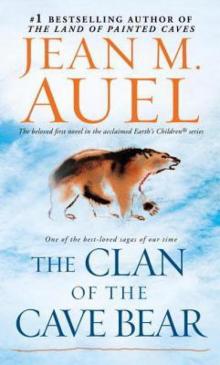 The Clan of the Cave Bear
The Clan of the Cave Bear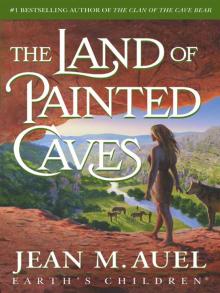 The Land of Painted Caves
The Land of Painted Caves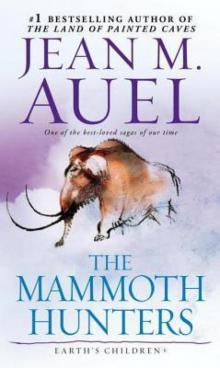 The Mammoth Hunters
The Mammoth Hunters The Earth's Children Series 6-Book Bundle
The Earth's Children Series 6-Book Bundle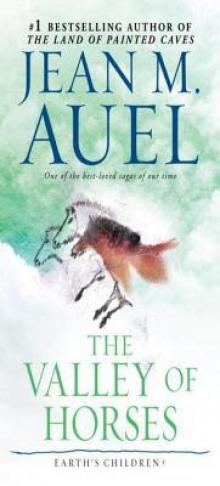 The Valley of Horses
The Valley of Horses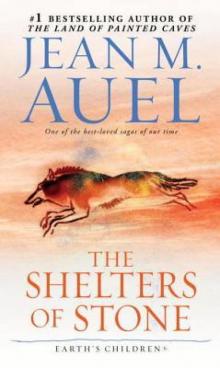 The Shelters of Stone
The Shelters of Stone The Clan of the Cave Bear ec-1
The Clan of the Cave Bear ec-1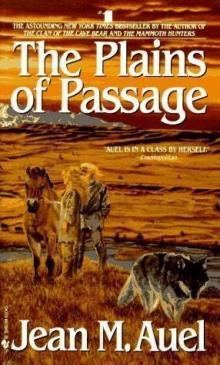 THE PLAINS OF PASSAGE ec-4
THE PLAINS OF PASSAGE ec-4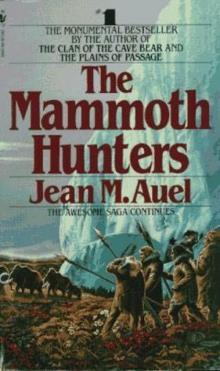 The Mammoth Hunters ec-3
The Mammoth Hunters ec-3 THE SHELTERS OF STONE ec-5
THE SHELTERS OF STONE ec-5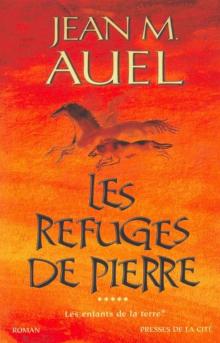 Les refuges de pierre
Les refuges de pierre![Earth's Children [02] The Valley of Horses Read online](http://i1.bookreadfree.com/i1/03/30/earths_children_02_the_valley_of_horses_preview.jpg) Earth's Children [02] The Valley of Horses
Earth's Children [02] The Valley of Horses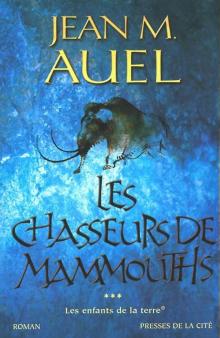 Les chasseurs de mammouths
Les chasseurs de mammouths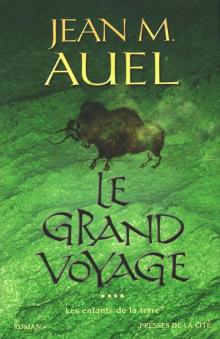 LE GRAND VOYAGE
LE GRAND VOYAGE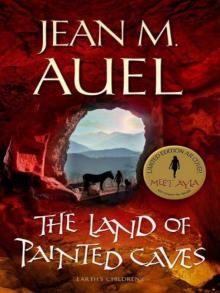 The Land of Painted Caves ec-6
The Land of Painted Caves ec-6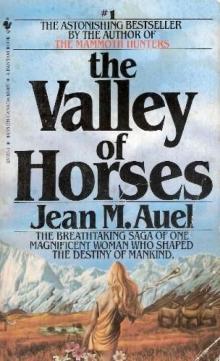 The Valley Of Horses ec-2
The Valley Of Horses ec-2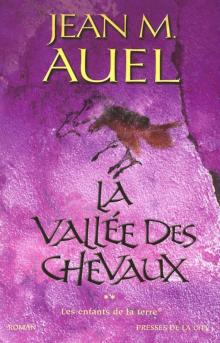 La Vallée des chevaux
La Vallée des chevaux